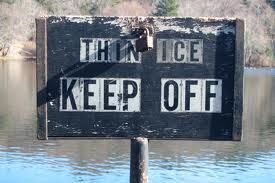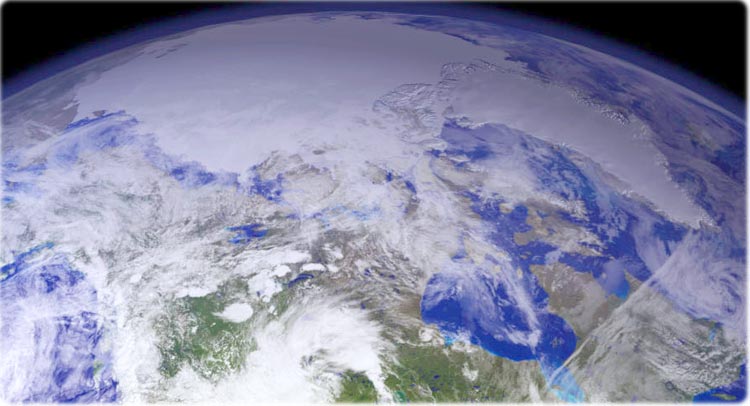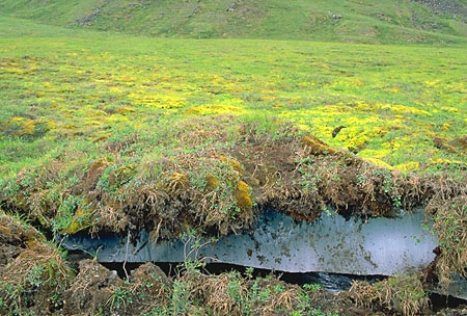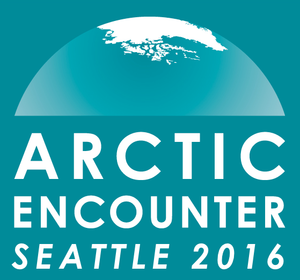|
|
|
|
|
|
|
|
Today's Congressional Action:
The House and Senate are in session and expected to consider non-Arctic legislation.
|
 How Psychology Can Save the World From Climate Change. Representatives from nearly 200 countries are meeting in France today to discuss climate change - and for good reason. To quote President Obama's State of the Union Address from earlier this year: "No challenge - no challenge - poses a greater threat to future generations than climate change." Yet public sentiment lacks the sense of urgency these remarks ought to instill. A 2014 poll by the Pew Research Center, for example, found that only 29 percent of respondents rated dealing with global warming as a top priority for the president and Congress; well below the percentage that endorsed strengthening the economy (80 percent), improving the job situation (74 percent), or defending the country from terrorism (73 percent) as top priorities. National Public Radio How Psychology Can Save the World From Climate Change. Representatives from nearly 200 countries are meeting in France today to discuss climate change - and for good reason. To quote President Obama's State of the Union Address from earlier this year: "No challenge - no challenge - poses a greater threat to future generations than climate change." Yet public sentiment lacks the sense of urgency these remarks ought to instill. A 2014 poll by the Pew Research Center, for example, found that only 29 percent of respondents rated dealing with global warming as a top priority for the president and Congress; well below the percentage that endorsed strengthening the economy (80 percent), improving the job situation (74 percent), or defending the country from terrorism (73 percent) as top priorities. National Public Radio
Climate Change Threatens Sami Way of Life. Global warming is having an huge impact on the lives of communities in the Arctic. DW News visits Sami reindeer herders in northern Sweden to see how their livelihoods and identity are under threat. DW News
 USC's Arctic Research is Timely for Climate Summit. As world leaders meet in Paris for the 2015 United Nations climate talks, new research co-authored by a University of the Sunshine Coast academic has suggested they look to the Arctic for inspiration on how to best respond to climate change. Dr. Tristan Pearce, who is a Research Fellow at USC's Sustainability Research Centre, was co-author of 'The Adaptation Challenge in the Arctic', which was published in the leading environmental journal Nature Climate Change in November. My Sunshine Coast USC's Arctic Research is Timely for Climate Summit. As world leaders meet in Paris for the 2015 United Nations climate talks, new research co-authored by a University of the Sunshine Coast academic has suggested they look to the Arctic for inspiration on how to best respond to climate change. Dr. Tristan Pearce, who is a Research Fellow at USC's Sustainability Research Centre, was co-author of 'The Adaptation Challenge in the Arctic', which was published in the leading environmental journal Nature Climate Change in November. My Sunshine Coast
Climate Change Likely to Increase Black Carbon Input to the Arctic Ocean. University of Georgia Skidaway Institute of Oceanography scientist Aron Stubbins led a team of researchers to determine the levels of black carbon in Arctic rivers and found that the input of black carbon to the Arctic Ocean is likely to increase with global warming. The results of their study were recently published in the journal Frontiers in Earth Science. Phys.org
 USGS Projects Large Loss of Alaska Permafrost by 2100. Using statistically modeled maps drawn from satellite data and other sources, U.S. Geological Survey scientists have projected that the near-surface permafrost that presently underlies 38 percent of boreal and arctic Alaska would be reduced by 16 to 24 percent by the end of the 21st century under widely accepted climate scenarios. Permafrost declines are more likely in central Alaska than northern Alaska. Phys.Org USGS Projects Large Loss of Alaska Permafrost by 2100. Using statistically modeled maps drawn from satellite data and other sources, U.S. Geological Survey scientists have projected that the near-surface permafrost that presently underlies 38 percent of boreal and arctic Alaska would be reduced by 16 to 24 percent by the end of the 21st century under widely accepted climate scenarios. Permafrost declines are more likely in central Alaska than northern Alaska. Phys.Org
|
Legislative Action
No Arctic legislation was formally considered yesterday.
|
|
Future Events
Arctic Council and Beyond, December 4, 2015 (Ottawa, Ontario, Canada). This one-day conference hosted by The Northern Institute will focus on the role of the Arctic Council as a forum for Arctic cooperation, the place of the Arctic in Canada's foreign policy and approach to the circumpolar world, the role of the Arctic in global relations in light of the increasing interest in the region by European and Asian states, and the voice of Indigenous Peoples within the Arctic Council and in shaping circumpolar countries' Arctic policies.
Paris Arctic Climate Research Strategy Meeting, December 4, 2015 (Paris, France). The purpose of this facilitated discussion is to discuss future regional, national, and international funding opportunities for interdisciplinary Arctic climate research and develop concrete ideas for such research. All disciplines across humanities, social and natural sciences, art, health, technology and others as well as representatives of research, government, civil society, business and others are encouraged to attend.
Arctic Encounter Paris (AEP 2015), December 11-12, 2015 (Paris, France) (During the UN Convention on Climate Change - COP21). The Arctic Encounter Paris (AEP) will take place at the French Senate at Luxembourg Palace and the  French Military College, ╔cole Militaire, in Paris, France, on the final days of the monumental United Nations Convention on Climate Change (COP21) where thousands of global citizens and government delegates will be gathered to deliberate the world's response to our changing planet in Paris. The AEP is the only Arctic policy and economics side event currently planned to take place during the UN Convention. A reception will take place following the closing panel. French Military College, ╔cole Militaire, in Paris, France, on the final days of the monumental United Nations Convention on Climate Change (COP21) where thousands of global citizens and government delegates will be gathered to deliberate the world's response to our changing planet in Paris. The AEP is the only Arctic policy and economics side event currently planned to take place during the UN Convention. A reception will take place following the closing panel.
 Fall meeting of the American Geophysical Union, December 14-18, 2015 (San Francisco, California). The 48th meeting of the union brings together nearly 24,000attendees, and lots of Arctic research results. The scientific program is here. There will be several Arctic-related "Town Hall" meetings, including those sponsored by NASA, DOE, NSF, ISAC, IARPC, and SEARCH. Fall meeting of the American Geophysical Union, December 14-18, 2015 (San Francisco, California). The 48th meeting of the union brings together nearly 24,000attendees, and lots of Arctic research results. The scientific program is here. There will be several Arctic-related "Town Hall" meetings, including those sponsored by NASA, DOE, NSF, ISAC, IARPC, and SEARCH.
The conference will be devoted to an opening of new academic semester and an upcoming 25 years cooperation between University of Nordland and Baltic State Technical University (St. Petersburg). On the second day the educational project's results "Arctic Bridge: Cooperation on PhD Education and Research Training in the field of Management in Extractive Industries in the High North" will be presented.
"Arctic Matters" day at the National Academy of Sciences, January 14th, 2016 (Washington, DC, USA) This symposium is part of an ongoing initiative of the National Academies of Science Polar Research Board to expand public understanding of why the dramatic changes affecting the Arctic region ultimately matter to us all. The agenda features engaging presentations and discussions with top Arctic science and policy experts, and displays and interactive exhibits that illustrate Arctic change and its global impacts. The event is free and open to the public. There are sponsorship opportunities, and a call for exhibitor applications (by Oct.31, 2015). Audience space is limited, so register today; and please encourage your friends, neighbors, and colleagues to participate-as our goal is to reach well beyond the small circle of specialists who typically attend Arctic-themed events in the DC area. The U.S. Arctic Research Commission is helping to sponsor this event.
 Building upon the preceding Arctic Encounter event in Paris, the third annual Arctic Encounter Symposium (AES) in Seattle, Washington will convene policymakers, industry leaders, and leading experts to confront the leading issues in Arctic policy, innovation, and development. As the largest annual Arctic policy event in the United States, the AES mission is to raise awareness, engage challenges, and develop solutions for the future of a region and a people. The two-day program includes two keynote luncheons, expert plenary sessions, break out sessions, a networking cocktail reception and seated dinner. A closing reception will take place at the conclusion of the program. Building upon the preceding Arctic Encounter event in Paris, the third annual Arctic Encounter Symposium (AES) in Seattle, Washington will convene policymakers, industry leaders, and leading experts to confront the leading issues in Arctic policy, innovation, and development. As the largest annual Arctic policy event in the United States, the AES mission is to raise awareness, engage challenges, and develop solutions for the future of a region and a people. The two-day program includes two keynote luncheons, expert plenary sessions, break out sessions, a networking cocktail reception and seated dinner. A closing reception will take place at the conclusion of the program.
2016 Arctic Frontiers, January 24-29, 2015 (Tromso, Norway).The Arctic is a global crossroad between commercial and environmental interests. The region holds substantial natural resources and many actors are investigating ways to utilise these for economic gain. Others view the Arctic as a particularly pristine and vulnerable environment and highlight the need to limit industrial development. Arctic Frontiers 2016 will discuss the balance between resource utilisation and preservation, and between industrial and environmental interests in the Arctic. Envisioning a well-planned, well-governed, and sustainable development in the Arctic, how can improved Arctic stewardship help balance environmental concerns with industrial expansion? How can the industrial footprints from future business activities be minimised? And last, but not least, what role will existing and emerging technologies play in making industrial development profitable and environmentally friendly, securing a sustainable growth scenario for Arctic communities?
16th Alaska Marine Science Symposium, January 25-29, 2016 (Anchorage, AK, USA). No detailed info yet (common guys...), but a valuable meeting, focusing on research results from the Gulf of Alaska, the Bering Sea, and the Arctic Ocean. Good, in-depth, research from Alaska's marine regions. AMSS.
** New this week** 5th Annual Fletcher Opening Arctic Conference, March 12, 2016. The Opening Arctic Conference builds on the Fletcher School's Warming Arctic International Inquiry series, to bring together high-level thought leaders from across disciplines, Fletcher's hallmark. Staged annually, Fletcher's event continues to address the foreign policy, economic, environmental and security implications of the opening Arctic, while dispelling myths.
14th IATS Seminar, June 19-25, 2016 (Bergen, Norway). The University of Bergen (UiB) is honoured to host the 14th IATS Seminar in Bergen, Norway, from Sunday 19 to Saturday 25 June 2016 in co-operation with the Network for University Co-operation Tibet-Norway, an academic network with the universities of Oslo, Bergen and Troms° as partners. The convenor is Professor Hanna Havnevik, Department of Culture Studies and Oriental Languages, University of Oslo, and Chair of the Network.
ICETECH 2016, August 15-18, 2016 (Anchorage, Alaska, USA). The Arctic Section of the Society of Naval Architects and Marine Engineers (SNAME) together with Alaska's Institute of the North (ION) will host the International Conference and Exhibition on Performance of Ships and Structures in Ice (ICETECH 16), the premiere international conference on ships and structures in ice. The conference will take place in Anchorage starting with an opening icebreaker reception on the evening of Monday, August 15, and concluding in the afternoon on Thursday August 18, with a possible workshop on Arctic EER on Friday August 19.
Inuit traditions are a repository of Inuit culture and a primary expression of Inuit identity. The theme for the 2016 Inuit Studies Conference invites Elders, knowledge-bearers, researchers, artists, policy-makers, students and others to engage in conversations about the many ways in which traditions shape understanding, while registering social and cultural change. The institutional hosts of "Inuit Traditions," Memorial University of Newfoundland and the Nunatsiavut Government, invite you to contribute to an exchange of knowledge to be held in St. John's, Newfoundland and Labrador, October 7-10, 2016. Presentations on all aspects of Inuit studies will be welcome.
|
|

  
4350 N. Fairfax Drive, Suite 510
Arlington, VA 22203, USA
External links in this publication, and on the USARC's World Wide Web site ( www.arctic.gov) do not constitute endorsement by the US Arctic Research Commission of external Web sites or the information, products or services contained therein. For other than authorized activities, the USARC does not exercise any editorial control over the information you may find at these locations. These links are provided consistent with the stated purpose of this newsletter and the USARC Web site.
|
|
|
|
|
|
|
|
|